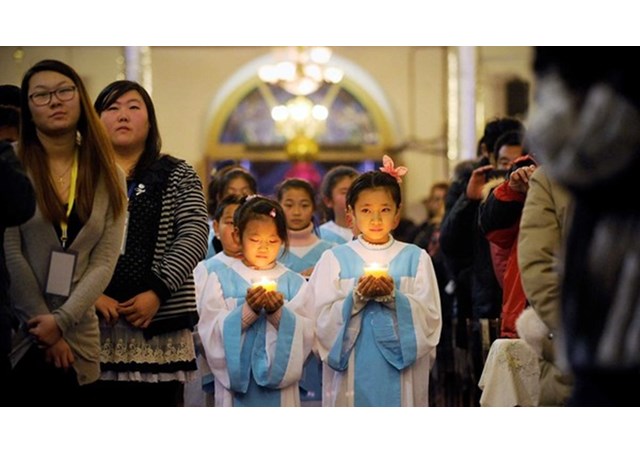
Conference addresses challenges facing Christianity in China

(Vatican Radio) The future of Christianity in China has been the focus of a four day conference which concluded in Hong Kong on Saturday.
Organised by the Ecclesiological Investigations International Research Network, the meeting brought together a wide range of theologians from different denominations and many national or ethnic backgrounds to discuss the challenges facing the different Christian Churches and communities in China today.
Philippa Hitchen has been following the conference and sent this final report:
Officially there are five faiths recognised by China’s ruling Communist party today: Buddhism and Taoism, the growing Islamic community, plus Christianity – meaning the many Protestant denominations – and the Catholic Church. Protestants and Catholics are required to register with the two state-run patriotic church organisations and in the past, Catholics who have refused and declared their loyalty to the Pope in clandestine house churches have risked persecution and long prison sentences.
Changing attitudes
But, at least in the rapidly developing towns and cities of China today, attitudes are changing, even though rights groups continue to report violations of the right to religious liberty and freedom of expression, with the persecution of activists on the grounds of enhanced national security. But as one Jesuit theologian, with long time ties to China, told the conference, there is a growing will among Chinese leaders to resolve the conflict between Beijing and the Vatican over the appointment of Catholic bishops – a key to improving conditions for the estimated nine to twelve million Catholics in the vast country today.
Appointment of bishops
Other Asian experts agreed there are increasing expectations of an agreement that would see Pope Francis offering rapprochement – within this year of mercy - to eight bishops consecrated without Vatican approval and the setting up a system of new nominations acceptable to both Beijing and Rome. This would most likely reflect the practise elsewhere in Asia, or nearer to home in the Swiss city of Basel, where local Church leaders nominate bishops whose names are forwarded for approval by the Holy See. That could lead to a resumption of diplomatic relations, 65 years after all missionaries were expelled and the communist crackdown on religion began.
Business ethics
In the meantime, I discovered much work is being done to engage ecumenical and interfaith partners to show how much religious faith can contribute to common good. Caritas services to the poor and needy or Catholic social teaching, though documents like the ‘Vocation of the Business Leader’, recently translated into Chinese, highlight practical ways in which the Church offers insights and experience to tackle the many crises facing Chinese society.
Environmental crisis
I also heard a compelling study of the way Pop Francis’ encyclical ‘Laudato Si’, both echoes the ancient wisdom of Buddhist, Tao and Confucian philosophy and points the way towards resolving the environmental disaster overshadowing China’s huge economic development.
Legacy of dialogue
As the Pope himself remarked in an interview marking the Chinese New Year in February, “the great richness of the country’s future lies in “the memory of its cultural past.” Recalling the work of 16th century Jesuit missionary Matteo Ricci, he insisted it’s vital to enter into dialogue with China, which he described as “an accumulation of wisdom and history”. Ricci's huge legacy of learning and encounter, I discovered, thrives among those seeking to promote harmony and hope for Christians in China today.
| All the contents on this site are copyrighted ©. |


